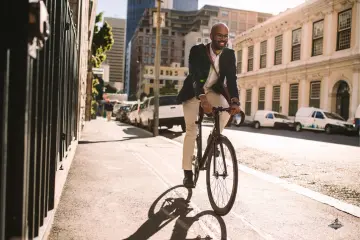
Hey, fellow cyclists! If you’re wondering “can you ride a bike on the sidewalk,” the short answer is: It depends on where you are, generally yes in many U.S. states like Colorado and Florida, but no in places like Virginia or parts of New York City, with local rules often trumping state ones. Riders under 13-16 may get a pass in some spots, but adults usually face fines or must yield to pedestrians if allowed.
I learned this the hard way during a rushed commute in Boston, zipped onto the sidewalk to dodge traffic, only for a cop to wave me over with a $25 ticket and a stern “walk it” lecture. Heart racing, I pushed my bike a block, grumbling about “bike-friendly” signs that felt like jokes. You’re not alone if this confuses you; laws are patchwork like quilt squares, changing block by block. Let me share my mishaps from city streets to suburban paths, unpacking bike sidewalk laws by state, safety tips for when it’s okay, and why some choose roads anyway.
We’ll cover riding bikes on sidewalks legality, sidewalk cycling rules for adults, and how to check your local ordinances, all from my ticket-dodging days and a few “should I?” debates with riding pals. This guide’s for commuters dodging cars or kids learning balance, grab your helmet, and let’s navigate the gray areas together.
Bikw on Sidewalk Surprise
Riding a bicycle on the sidewalk presents risks for both bikers and walkers, so it’s important to be very careful. You should give way to all pedestrians, slow down to their pace, use a bell or your voice to alert people, be on the lookout for cars coming out of driveways, and get off your bike at crosswalks since sidewalks are meant for walking, and drivers aren’t expecting bikes there.
Rules can differ by location, but the main idea is to ensure pedestrian safety by biking in a predictable and careful manner, or choosing to ride on the road when it’s busy.
Risks of Riding on Sidewalks
- Driver Misunderstanding: Drivers exiting driveways often miss cyclists on sidewalks because they are watching for cars, not for fast-moving bicycles.
- Pedestrian Risks: Sidewalks may have various things in the way (like poles and benches), and pedestrians can behave unexpectedly, which could lead to accidents.
- Uneven Ground: Sidewalks are not designed for bicycles, which can make them uneven and risky.
Tips for Safety and Etiquette
- Give Way to Walkers: Always let them go first; they have priority.
- Reduce Speed: Ride at about the same speed as walking.
- Make Yourself Known: Use your bell or say “on your left” before you pass anyone.
- Be Aware of Cars: Stay alert around every driveway and crossing point.
- Follow Traffic Flow: Ride in the same direction as vehicles on the street.
- Get Off Your Bike: Walk your bike in crowded places or when crossing busy streets or crosswalks.
- Be Consistent: Keep a slow and steady speed.
When It Might Be Acceptable (If Allowed)
- On spacious, not crowded sidewalks with few driveways.
- If crossing a busy road repeatedly isn’t practical.
When to Stay Away from It
- When sidewalks are packed with pedestrians.
- If you can’t ride at walking speed.
- If riding there is against the law in your area (check your local rules, as they can differ).
A Quick Tale of What Happens When You Don’t Know the Rules
It was a drizzly morning in Philly, backpack heavy with a laptop, and the road felt like a dodgeball game with cabs. “Why not the sidewalk?” I thought, hopping on for a block, smooth sailing until a pedestrian glared, and I realized the sign: “No bikes.” No ticket that time, but the awkward dismount burned. That’s the sidewalk riding reality: Legal in broad strokes for some, but a local lottery everywhere else.
My pal in Denver laughs, he cruises sidewalks freely, state law greenlighting it. Pros of knowing: Fines avoided, confidence gained. Cons? Patchwork puzzles; my cross-state moves meant relearning yearly. If you’re second-guessing a shortcut, you’re smart, better safe than sorry (or cited).
The Legal Lowdown: Bike Sidewalk Laws Across the U.S. and Beyond
U.S. laws lean state-by-state, with cities calling shots. Colorado’s cyclist-friendly: Statewide, okay, yield to peds. Florida? Generally yes, but no more than two abreast, helmets for under-16s. Virginia? Strict no for vehicles, but bikes sneak in as exceptions, still, local bans bite. California? Local call; LA allows, but Miami nixes spots like Southwest 8th Street.
New York? State silent, but NYC’s RCNY 4-07 bans adult bikes on sidewalks unless wheels are under 26 inches and rider is 12 or younger, confiscation possible. Minnesota? Discourages speed mismatches; kids under 10 encouraged, adults yield with bells.
Arkansas? City-dependent; some welcome, some wall off. From my relocations, check apps like Bike Law or state DMVs, my Florida fine stemmed from ignoring a municipal no-go. Pros: Flexibility fits urban quirks. Cons? Confusion breeds tickets; $25-100 stings.
Kids vs. Adults: Sidewalk Cycling Rules That Change with Age
Age flips the script, kids often get sidewalk grace. In Florida, under-16s must helmet up but can ride; my niece’s training wheels cruise paths worry-free. NYC? 12 and under on small wheels okay; adults? Walk it or face fines. Colorado? All ages are fine, but yield always.
Minnesota? Under-10s urged to use sidewalks for skill-building; adults discouraged from pedestrian perils. My brother in Boston pushes his 8-year-old on paths, legal pass, safer start. Pros: Protects young learners from roads. Cons? Teens hit gray zones; 13-year-olds in NYC dismount awkwardly. Insight: Family rides? Know cutoffs; my cross-state confusion led to a “walk the last block” compromise.
Safety First: Why Riding Bikes on Sidewalks Might Not Be as Safe as It Seems
Legal or not, sidewalks scare experts, Bicycle Alliance warns speed mismatches endanger peds and riders. My Philly dash? Nearly clipped a jogger; their yell shook me more than traffic. Roads let bikes flow at 10-15 mph; sidewalks cap at walking pace, risking slips on cracks or dog walkers.
Florida law mandates bells for passing, smart, but ignored in my rush. Pros: Shields from cars in bike-lane voids. Cons? Blind corners hide hazards; my curb-jump wobble could’ve ended ugly. From Florida Cycling Law, road riding’s statistically safer, visibility trumps seclusion. My shift? Mixed: Sidewalks for short kid hauls, roads for commutes.
State-by-State Snapshot: Quick Guide to Bike Sidewalk Legality for Easy Reference
Laws shift, but here’s a 2025 snapshot from my state-hopping notes:
- Colorado: Yes statewide; yield to peds.
- Florida: Generally yes; helmets under 16, no more than two abreast.
- California: Local vary; LA yes, some streets no.
- Virginia: No for vehicles, but bikes allowed unless local ban.
- New York: NYC no for adults; small wheels/kids okay.
- Minnesota: Discouraged; kids under 10 encouraged.
- Arkansas: City-specific; some allow, some prohibit.
- Texas: Yes in many areas; yield with signals.
Pros: At-a-glance saves scours. Cons? Updates needed; my outdated app led to a warning. Check Municode or BikeLaw for fresh rules.
Why Some Cyclists Skip Sidewalks for Roads: My Road Warrior Revelations
Roads feel risky, but many shun sidewalks for flow, my 5-mile commute halved time off-path, dodging peds for a steady cadence. Experts like BikeMN note sidewalks cramp speeds, raising crash odds with turns. In Jacksonville Reddit threads, riders stick to roads despite “unhinged” drivers, visibility wins over seclusion.
My Boston ticket? Switched to lanes with lights, feeling exposed but empowered. Pros: Predictable traffic, bike lane perks. Cons? Close calls with cars; my mirror glance saved a dooring once. Balanced: Sidewalks for safety nets, roads for efficiency, know when to hop off.
Fines and Fixes: What Happens If You Ride Bikes on Sidewalks Where It’s Not Allowed
Busted? Fines sting, NYC $50-100, Florida $25-50, warnings often. My Philly near-miss? Cop chat, no ticket, but lesson landed. Fixes? Dismount and walk, legal everywhere, or reroute to paths.
Appeals? Rare wins; documentation helps. Pros: Leniency for first-timers. Cons? Repeaters rack fees; my pal’s second NYC hit $100. Tip: Apps like Ride with GPS flag no-go zones, my pre-ride checks dodged drama.
Global Glimpses: How Bike Sidewalk Rules Differ Outside the U.S.
Curious beyond borders? UK’s Highway Code allows if “reasonable,” but yields heavily, my London visit saw packed paths, bikes weaving warily. Canada’s provinces vary; Ontario, yes, for kids, adults, case-by-case. Australia’s states, like Victoria, ban adults; kids under 12 are okay.
My Toronto spin? Sidewalk is fine for short hops, but roads felt freer. Pros: International inspo broadens views. Cons? Jet-set rules confuse; stick to local. Insight: U.S. patchwork mirrors global mix, adapt, don’t assume.
Tips for Safe Sidewalk Riding When It’s Legal: My Do’s and Don’ts from the Saddle
Legal green light? Ease on: Walk pace (5-8 mph), bell for passes, eyes on peds. My Florida path rule: Hug right, announce “on your left.” Helmets always; my bump once proved it. Pros: Quick safety swaps. Cons? Speed traps linger, my 12 mph clip earned glares. Hack: Mix modes; sidewalk for crossings, road for stretches.
Wrapping Up: Pedal Smart, Wherever the Path Leads
Can you ride a bike on the sidewalk? Yes in spots, no in others, but knowing local leans keeps rides smooth and ticket-free. My mishaps to mastery? Check signs, yield kindly, and flow where it fits. Urban dash or kid cruise? Adapt and enjoy. Your sidewalk story, a smooth sail or stern stop? Share below, keep the wheels turning!
FAQs
Local varies; many yes, but check city codes.
Generally, no in NYC; dismount or face fines.
Yes, with helmets under 16, yield to pedestrians.
Safety risks to peds and riders; roads are safer for speed.
$25-100 by state; warnings are common the first time.
No, in many places it is illegal to ride a bike on a public footway or pavement. A footway is for people who are walking. Cycling on a public footpath can also be seen as a civil offense against the landowner.
Riding your bike is often a more intense workout than walking. It burns more calories per minute in most cases. Walking is a better choice if you want a low-impact workout or to burn more fat.
Street bikes, especially sport bikes, can be less comfortable for some riders. Their aggressive, forward-leaning design can put strain on your back, neck, and wrists. Comfort often depends on the specific bike and the length of your ride.
No, bikes are generally not safer on sidewalks than on the street. Sidewalk riding can be very dangerous. Drivers do not expect fast bikes at crosswalks and intersections, leading to more accidents.
A good lifespan for a street motorcycle varies by type. Smaller sport bikes may be considered high mileage around 25,000 miles. Larger cruiser and touring bikes can last well past 50,000 miles with good care.
It is generally safer to ride your bike on the street. The safest place to bike is on the street, where cyclists follow traffic rules like cars. Riding on the sidewalk increases your risk of a crash with a car or a pedestrian.
Cruiser bicycles are often the most comfortable bikes. They are designed for a relaxed, upright sitting position. Cruiser bikes have wide seats and thick tires for a smooth, shock-free ride.

Co-Founder, Owner, and CEO of RoadHybridBike.
Ehatasamul Alom is a dedicated road hybrid bikes expert. With over 15 years of experience, he helps people find the perfect ride. He began his journey as a bike mechanic. He learned the ins and outs of every bike.
Ehatasamul Alom holds a Master’s degree in Mechanical Engineering from a top university, where he specialized in material science and bicycle kinematics. His master’s thesis focused on optimizing frame geometry for road hybrid bikes to improve rider comfort and efficiency.
Ehatasamul has an extensive professional background. He spent 10 years as a Senior Bike Designer at “Urban Cycles,” a leading bicycle manufacturer. In this role, he led the development of several award-winning road hybrid bikes, which are known for their durability and performance. He later served as the Head of Product Development at “Gear Up,” a company specializing in high-end cycling components. There, he developed innovative parts and accessories specifically for road hybrid bikes.
Over the years, Ehatasamul has become an authority on road hybrid bikes. He understands their design and function. His work focuses on making bikes easy to use. Ehatasamul believes everyone should enjoy cycling. He writes guides that are simple to read. His passion for road hybrid bikes is clear. His goal is to share his knowledge with everyone. He wants to see more people on two wheels. His advice is always practical and easy to follow.

Leave a Reply
You must be logged in to post a comment.